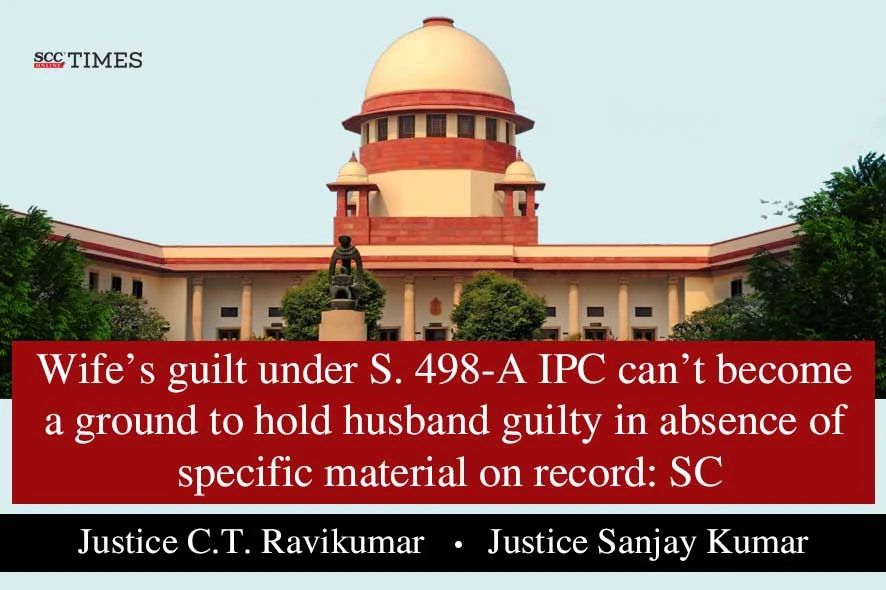Supreme Court: While considering the instant appeal challenging Bombay High Court’s decision confirming the appellant’s conviction under Section 498-A of Penal Code, 1860 (IPC) and commutation of sentence imposed therefor to the period of imprisonment already undergone; the Division Bench of C.T. Ravikumar* and Sanjay Kumar, JJ., set aside the impugned judgment of the High Court, thereby acquitting the appellant of the offence under Section 498-A IPC.
The Court found that there was no iota of evidence against the appellant to hold that he was guilty under Section 498-A IPC. Furthermore, just because the appellant’s wife was found guilty under Section 498-A IPC, cannot be a ground to hold the appellant guilty in the absence of any specific material on record.
Background:
The deceased victim got married to the 1st accused on 11-12-2008. The victim’s father alleged that the 1st accused and his relatives demanded dowry to purchase a residential flat and tortured her mentally and physically.
On 16-4-2011, the appellant, who was the husband of the victim’s sister-in-law, informed the victim’s father about the victim being admitted to hospital. By the time, the father reached, the victim had died.
This ushered a legal battle between the parties and victim’s father lodged a complaint leading to registration of FIR and eventually trial of the accused persons including the appellant. The Trial Court found the accused persons including the appellant guilty under Section 498-A IPC.
The Bombay High Court confirmed the appellant’s conviction but commuted his sentence.
Aggrieved with the afore-stated decision of the High Court, the appellant approached the Supreme Court.
Contentions:
Counsel for the appellant submitted that as a result of this conviction, the appellant has been terminated from the post of Laboratory Attendant.
The appellant contended that during the alleged period of torture for dowry of Rs. 5 lakhs, which was the main alleged cruelty, the appellant was not even a relative of the 1st accused and his family, to fall within the expression ‘relative’ used in Section 498-A, IPC. It was further argued that there is no specific evidence against the appellant vis-a-vis allegation under Section 498-A and should be given some benefit of doubt.
Per contra, the respondents argued that the trial Court and High Court carefully examined the evidence and arrived at the finding of guilt against the appellant based on proper appreciation of evidence.
Court’s Assessment:
Perusing the facts, contentions and Section 498-A, IPC, the Court noted that the evidence on record revealed that appellant’s marriage with one of the accused person conducted much later viz., only on 26-10-2010. The unfortunate incident resulting in the victim’s death occurred hardly within five and half months since appellant became a relative of the family of the accused persons.
The Court further noted that despite the general and vague allegation, no specific accusation was raised against the appellant. It was pointed out that none of the prosecution witnesses had specifically deposed against the appellant herein of his having committed any cruelty which will attract the offence under Section 498-A IPC, against him.
Furthermore, simply because the appellant’s wife’s guilt under Section 498-A IPC was proved, the same cannot be a ground to find the appellant guilty.
Relying on relevant precedents, the Court observed that it is a matter of common knowledge that exaggerated versions of the incident are reflected in a large number of complaints and the tendency of over implication is also reflected in a large number of cases. Hence, the Division Bench opined that in Section 498-A IPC cases, the courts have to be careful to identify instances of over implication and to avert the suffering of ignominy and inexpiable consequences, by such persons.
The Court further found that the finding of guilt against the appellant by the courts below for the offence under Section 498-A IPC, with the aid of Section 34 IPC, was absolutely perverse in view of the absolute absence of any evidence against him to connect him with the said offence in any manner.
Therefore, the Court held the appellant’s conviction and sentence under Section 498-A IPC to be unsustainable in law and thus, quashed the impugned judgments and acquitted the appellant of the charges.
CASE DETAILS
|
Citation: Appellants : Respondents : |
Advocates who appeared in this case For Petitioner(s): For Respondent(s): |
CORAM :










